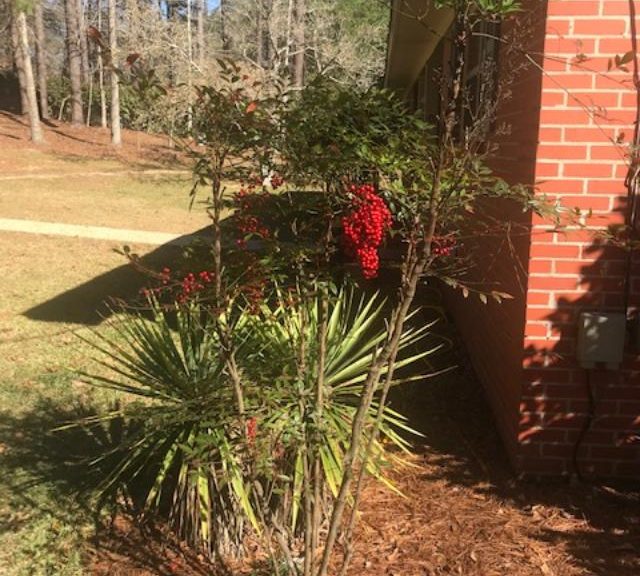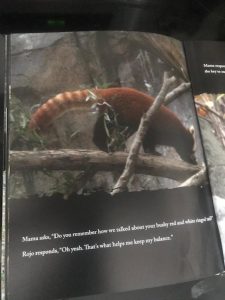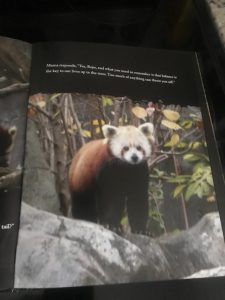I had been reading and writing to no avail for 4+ hours. It was time to walk away, get my daughter off her electronics, and get some fresh air outside with the dogs. I didn’t get far when I noticed 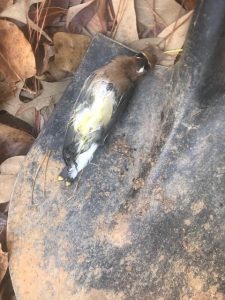
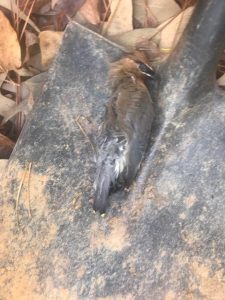
Wow, it’s a gorgeous bird I knew nothing about. After I respectfully buried it, I came inside and consulted my bird book to no easy match. I then turned to a Face Book Group called Birding Alabama. In minutes the members of the group informed me that it was a Cedar Waxwing. Not only that, but one woman surmised that it died from eating from a Nandina Berry Bush otherwise known as Sacred Bamboo. I immediately thought of a bush in my back yard. I took this picture and asked if this was it.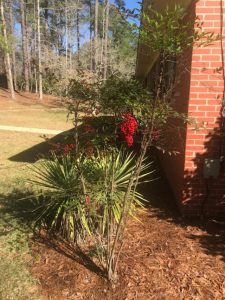
Low and behold it is. It took some time for me to realize along with more comments from the group like this article from Audubon Society that if I care about these birds I need to get rid of these gorgeous berries and lovely little bush. But they are so beautiful!
According to this article, “The U.S. Department of Agriculture and most states classify Nandina domestica as a noxious, non-native, invasive weed from China and Japan. It has naturalized and invaded our national parks, national wildlife refuges, national forests, city parks, and other habitats throughout the U.S. …In addition to bird deaths in Georgia, bird deaths have been reported in Houston and other parts of the country. Hydrogen cyanide is a painful and unnecessary way for birds to die. Nandina is also toxic to dogs, cats, and many other animals.”
“Non-native” hmmm that’s an inflammatory adjective. It is this term I know turn my writing.
As a former public school science teacher I’ve taken myself on numerous professional development opportunities as well as my classes on field trips to remove some of these non-native plants. But the key to fully understanding which plants need to be removed are several other key adjectives included in the description of this Heavenly Bamboo. “Noxious and invasive” are key descriptors.
“Noxious” in human relation terms is lack of respect for that which was there to begin with. “Invasive” means that it is “I”, “me”, “my kind”, “my way or the highway.” This is so important in both the natural world and human. Why? Well, first of all the truly native plants in each part of the world aren’t sufficient to feed us. Yup, most of the fruits and vegetables that you eat everyday didn’t originate in the country you live in. They came from another part of the world. For example, consider this figure from ncbi.nlm.nih.gov

In other words, non-natives and immigration are necessary for the survival of people. The issue is what other characteristics describe these non-natives? Are they respectful? Do they politely integrate and get along? Or are they there to rape, pillage, kill, and conquer? Do not judge on outward appearance of “cute” or “pretty.” One must consider all of its characteristic properties.
Two points. First, consider for nature and for self. Not all non-native plants, animals, and insects are problematic for the natural environment they have come to. There may be enough “checks and balances” or “predator/prey” for a healthy balance for the original community. But is all that was naturally present good and worthy to keep?
This is one of the most confusing parts of the Pentateuch or first five books of the Bible. Why did God command the Israelites to exterminate the Canaanites, yet allowed the king and the people of Nineveh live in the book of Jonah?
Could it be that some are so vile, noxious, and invasive that they need to be denied, uprooted, and sent away? Do they need to stay among themselves?
We truly miss out though if we close the doors to other cultures. What are they getting better than we? What resources, supplies, and knowledge do they have that might be shared without hurting any? So it goes back to concept of balance which requires discernment and maturity. Of which I wrote of in Rojo, The Baby Red Panda at the Zoo.
In closing, let us strive to grow in wisdom and maturity. Let us be accountable. Appropriate checks and balances are needed for all. May we study and learn diligently, otherwise “non-native,” a completely neutral descriptive adjective is not understood and not handled properly. It needs more description. Is it respectful? Beneficial to the common or just one or two greedy individuals?
by Hope Mucklow
